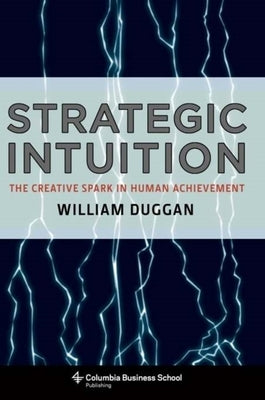Description
How "Aha " really happens. When do you get your best ideas? You probably answer "At night," or "In the shower," or "Stuck in traffic." You get a flash of insight. Things come together in your mind. You connect the dots. You say to yourself, "Aha I see what to do." Brain science now reveals how these flashes of insight happen. It's a special form of intuition. We call it strategic intuition, because it gives you an idea for action-a strategy. Brain science tells us there are three kinds of intuition: ordinary, expert, and strategic. Ordinary intuition is just a feeling, a gut instinct. Expert intuition is snap judgments, when you instantly recognize something familiar, the way a tennis pro knows where the ball will go from the arc and speed of the opponent's racket. (Malcolm Gladwell wrote about this kind of intuition in Blink.) The third kind, strategic intuition, is not a vague feeling, like ordinary intuition. Strategic intuition is a clear thought. And it's not fast, like expert intuition. It's slow. That flash of insight you had last night might solve a problem that's been on your mind for a month. And it doesn't happen in familiar situations, like a tennis match. Strategic intuition works in new situations. That's when you need it most. Everyone knows you need creative thinking, or entrepreneurial thinking, or innovative thinking, or strategic thinking to succeed in the modern world. All these kinds of thinking happen through flashes of insight--strategic intuition. And now that we know how it works, you can learn to do it better. That's what this book is about. Over the past ten years, William Duggan has conducted pioneering research on strategic intuition and for the past three years has taught a popular course at Columbia Business School on the subject. He now gives us this eye-opening book that shows how strategic intuition lies at the heart of great achievements throughout human history: the scientific and computer revolutions, women's suffrage, the civil rights movement, modern art, microfinance in poor countries, and more. Considering the achievements of people and organizations, from Bill Gates to Google, Copernicus to Martin Luther King, Picasso to Patton, you'll never think the same way about strategy again. Three kinds of strategic ideas apply to human achievement: * Strategic analysis, where you study the situation you face
* Strategic intuition, where you get a creative idea for what to do
* Strategic planning, where you work out the details of how to do it. There is no shortage of books about strategic analysis and strategic planning. This new book by William Duggan is the first full treatment of strategic intuition. It's the missing piece of the strategy puzzle that makes essential reading for anyone interested in achieving more in any field of human endeavor.
Author: William Duggan
Publisher: Columbia Business School Publishing
Published: 06/04/2013
Pages: 176
Binding Type: Paperback
Weight: 0.75lbs
Size: 8.90h x 6.00w x 0.60d
ISBN13: 9780231142694
ISBN10: 0231142692
BISAC Categories:
- Business & Economics | Entrepreneurship
- Psychology | Creative Ability
- Business & Economics | Knowledge Capital
* Strategic intuition, where you get a creative idea for what to do
* Strategic planning, where you work out the details of how to do it. There is no shortage of books about strategic analysis and strategic planning. This new book by William Duggan is the first full treatment of strategic intuition. It's the missing piece of the strategy puzzle that makes essential reading for anyone interested in achieving more in any field of human endeavor.
Author: William Duggan
Publisher: Columbia Business School Publishing
Published: 06/04/2013
Pages: 176
Binding Type: Paperback
Weight: 0.75lbs
Size: 8.90h x 6.00w x 0.60d
ISBN13: 9780231142694
ISBN10: 0231142692
BISAC Categories:
- Business & Economics | Entrepreneurship
- Psychology | Creative Ability
- Business & Economics | Knowledge Capital
About the Author
William Duggan is senior lecturer at Columbia Business School, where he teaches strategic intuition in graduate and executive courses. He has given talks and workshops on strategic intuition to thousands of executives from companies in countries around the world. His most recent book is Creative Strategy: A Guide for Innovation, a sequel to Strategic Intuition.

